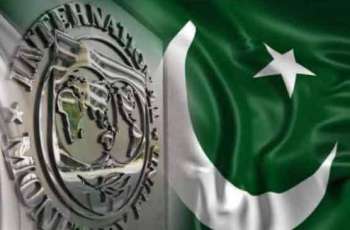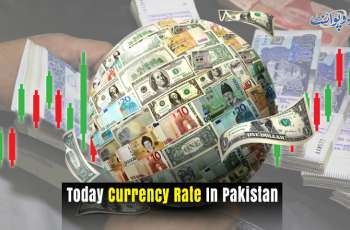NEW YORK (Pakistan Point News / Sputnik - 11th March, 2020) The worst crude price drop in nearly 30 years might be the start of a prolonged pain that could bankrupt the most vulnerable energy companies and governments that depend on the commodity, industry participants told Sputnik.
Oil prices fell about 25 percent on Monday in the biggest one-day drop for US crude values since 1991, sparking turmoil across stocks and other world markets, although there was a rebound on Tuesday due to government responses to the crisis.
The selloff came as major oil producers Saudi Arabia and Russia failed to agree on output cuts to mitigate demand lost to the coronavirus crisis. Riyadh also announced it was slashing the selling price of its crude to win more market share over Russian and US oil.
In Monday's trade, Saudi Aramco shares fell 5.5 percent, Exxon Mobil lost 12 percent and Rosneft slid 21 percent. But stocks of US shale drillers took heavier blows.
Tuesday saw a rebound in oil of as much as 10% due to sweeping stimulus measures being considered by the Trump administration to mitigate the worst effects of the coronavirus. The Washington Post reports that the measures could include help for the shale oil industry.
However, Tuesday's gains were limited as investors remain wary of volatility in days ahead.
"This will be painful for the Saudi Aramcos, Rosnefts and Exxon Mobils of the world," John Kilduff, founding partner at Again Capital, an energy hedge fund in New York, said, referring to the largest energy companies. "But the ones really gutted by this will be the highly-debted small shale oil drillers in Texas, as well as politically-vulnerable states like Nigeria, Libya and Malaysia that almost entirely depend on oil for their national budgets."
On Monday, EOG Resources lost 32 percent, Parsley Energy tumbled 39 percent, Diamondback Energy dived 44.7 percent and Continental Resources plunged 52.5 percent.
Even before Monday's plunge, some of these shale oil producers had planned cutbacks in spending.
Diamondback Energy cut its activity from nine completion crews to six, dropping two more completion crews than scheduled. The shale producer said it will also cut capital spending, though it didn't specify an amount.
Parsley Energy said it has slashed its 2020 free cash flow outlook to at least $85 million from a prior view of at least $200 million, and announced a general activity slowdown as well.
EOG Resources also intends to curb spending to protect return to its shareholder dividend, saying it will release details later.
Occidental Petroleum, another prominent US oil driller, said on Tuesday it was trimming its dividend to $0.11 from $0.79 per share. The company also said it will reduce 2020 capital spending to between $3.5-3.7 billion from $5.2-5.4 billion and implement additional operating and corporate cost reductions.
For now, the obvious winners from the oil crash are those who have been short selling crude, such as Tariq Zahir, managing member at Tyche Capital Advisors fund in New York.
"I see a longer way down for oil from here, and I'm going to sell into any rebound I see," Zahir told Sputnik.
Despite Tuesday's rebound the market could remain highly volatile in coming days as Saudi Aramco said it would increase supply to 12.3 million barrels per day (bpd) in April for customers inside the kingdom and abroad. That's 300,000 bpd above its maximum production capacity, a sign the kingdom was also freeing up crude from storage.
Russian oil companies, meanwhile, plan to boost output by up to 300,000 bpd, with the country's oil producers having the potential to increase output by 500,000 bpd, Energy Minister Alexander Novak said Tuesday.
On Monday, President Donald Trump took to Twitter to say the selloff will also benefit American consumers, who were responsible for nearly 80 percent of US economic growth.
"Good for the consumer, gasoline prices coming down!" the president tweeted.
He also described the selloff as nothing more than a show of power between Riyadh and the Kremlin and the insidious work of some media.
"Saudi Arabia and Russia are arguing over the price and flow of oil. That, and the Fake news, is the reason for the market drop!" Trump said.
Following up with the president's tone, the US Energy Department said in a statement that "The United States, as the world's largest producer of oil and gas, can and will withstand this volatility".
It characterized the Saudi-Russian actions as "attempts by state actors to manipulate and shock oil markets".
The White House also said Trump had spoken with Saudi Arabia's Crown Prince Mohammed bin Salman in a call to discuss global energy markets.
In an attempt to further calm oil prices, the Energy Department suspended on Tuesday its planned sale of crude from the US Strategic Petroleum Reserve, citing market turmoil.
Sadad al-Husseini, former vice president of state-owned Saudi Aramco, who now runs consulting firm Husseini Energy, defended Riyadh from accusations that the kingdom was acting recklessly in announcing higher production and lower prices for its crude when world markets already had too much oil from the demand destruction caused by the coronavirus.
"You're misreading what the kingdom is doing," al-Husseini told CNBC. "By making even more oil available to the market and at cheaper prices, you can make a case that Saudi Arabia is actually stimulating the world economy."
Kilduff of Again Capital partly agreed with that theory.
"Prices at these lower levels are incredibly stimulative to the world economy. It gives countries like India a huge break and a huge cost advantage," he told Sputnik.
Pavel Molchanov, director and equity research analyst at Raymond James & Associates, told CNBC that the Saudi-Russian crisis was unlikely to end quickly.
"Neither MBS nor Putin wants to be the first to blink," he said, referring to Saudi Crown Prince Mohamed bin Salman and Russian President Vladimir Putin.
"The earliest I see a solution from the Russian side will be on April 22nd, when the Russian Constitutional Referendum is held," Molchanov added. "Once Putin gets past that, he'll be in a position to show more flexibility, including in foreign policy. Until then, he'll be concerned about nationalist fervor."
The Kremlin's spokesman Dmitry Peskov said on Tuesday Russia was still open to negotiating an oil pact with Riyadh in the future. But Saudi Energy Minister Prince Abdulaziz bin Salman ruled out any talks for now. "Every oil producer in the free market can take care of their own market share," the prince told state television.



